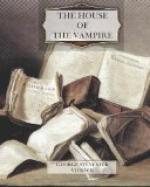“Oh, no. I should never have undertaken that. I haven’t done a stroke of work on it for several weeks. In fact, ever since Walkham called, I simply couldn’t. It seemed as if a rough hand had in some way destroyed the web of my thought. Poetry in the writing is like red hot glass before the master-blower has fashioned it into birds and trees and strange fantastic shapes. A draught, caused by the opening of a door may distort it. But at present I am engaged upon more important work. I am modelling a vessel not of fine-spun glass, but of molten gold.”
“You make me exceedingly anxious to know what you have in store for us. It seems to me you have reached a point where even you can no longer surpass yourself.”
Reginald smiled. “Your praise is too generous, yet it warms like sunshine. I will confess that my conception is unique. It combines with the ripeness of my technique the freshness of a second spring.”
Ernest was bubbling with anticipated delights. His soul responded to Reginald’s touch as a harp to the winds. “When,” he cried, “shall we be privileged to see it?”
Reginald’s eyes were already straying back to his writing table. “If the gods are propitious,” he remarked, “I shall complete it to-night. To-morrow is my reception, and I have half promised to read it then.”
“Perhaps I shall be in the position soon to let you see my play.”
“Let us hope so,” Reginald replied absent-mindedly. The egotism of the artist had once more chained him to his work.
X
That night a brilliant crowd had gathered in Reginald Clarke’s house. From the studio and the adjoining salon arose a continual murmur of well-tuned voices. On bare white throats jewels shone as if in each a soul were imprisoned, and voluptuously rustled the silk that clung to the fair slim forms of its bearers in an undulating caress. Subtle perfumes emanated from the hair and the hands of syren women, commingling with the soft plump scent of their flesh. Fragrant tapers, burning in precious crystal globules stained with exquisite colours, sprinkled their shimmering light over the fashionable assemblage and lent a false radiance to the faces of the men, while in the hair and the jewels of the women each ray seemed to dance like an imp with its mate.
A seat like a throne, covered with furs of tropic beasts of prey, stood in one corner of the room in the full glare of the light, waiting for the monarch to come. Above were arranged with artistic raffinement weird oriental draperies, resembling a crimson canopy in the total effect. Chattering visitors were standing in groups, or had seated themselves on the divans and curiously-fashioned chairs that were scattered in seeming disorder throughout the salon. There were critics and writers and men of the world. Everybody who was anybody and a little bigger than somebody else was holding court in his own small circle of enthusiastic admirers. The Bohemian element was subdued, but not entirely lacking. The magic of Reginald Clarke’s name made stately dames blind to the presence of some individuals whom they would have passed on the street without recognition.




